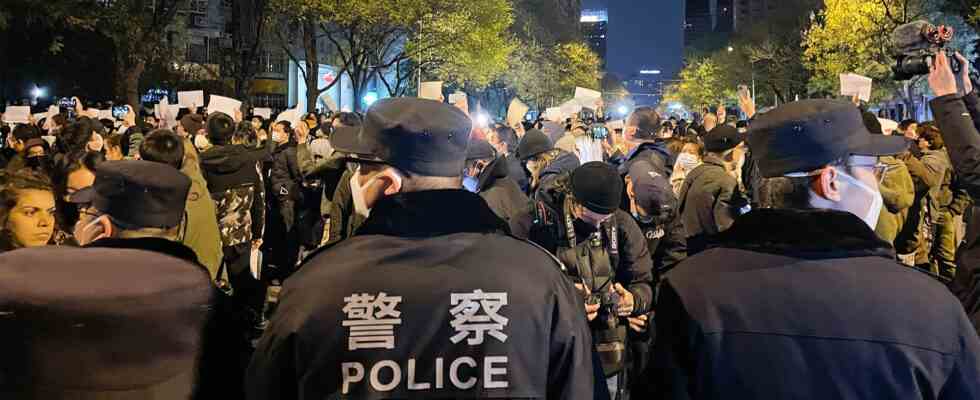Status: 11/28/2022 1:51 p.m
Millions of people in China are currently affected by lockdowns. However, protests against the zero-Covid policy are taking place in many cities. Beijing still seems to want to stick to this.
These are the largest demonstrations since the democracy movement in China in 1989, which the military brutally suppressed at the time. At the weekend there were protest marches in the capital Beijing and other cities with a population of over a million, such as Shanghai, Chengdu, Chongqing, Wuhan, Nanjing, Xi’an and Guangzhou. They were directed against the strict measures of China’s zero-Covid policy, such as repeated lockdowns, mass corona tests and forced quarantine.
The demonstrations lasted until Monday night. Dissatisfaction is also stirring at universities such as Tsinghua University in Beijing. It is unclear how many people were arrested. China was in virtual news blackout. Social media was full of video recordings, which were quickly deleted by the censors.
In the early hours of the night, a large contingent of police in Beijing went against hundreds near the diplomatic district. Further protest actions were announced. But the government has mobilized strong security forces. Among other things, eyewitnesses reported a large police presence at critical points in Shanghai.
Apartment fire in Urumqi was the trigger
The trigger for the rare public expressions of dissatisfaction was an apartment fire in the metropolis of Urumqi in Xinjiang in northwest China on Thursday evening that killed at least ten people. Many expressed the suspicion that the rescue work was hampered by the strict corona measures.
As a symbol of resistance and protest against censorship, many demonstrators held up blank white sheets. There were shouts of “lift the lockdown” and “we don’t want PCR tests, we want freedom”.
Due to the rigid measures against the corona virus, dissatisfaction among the population had been increasing for weeks. Many megacities are largely paralyzed. People are bothered by the constant testing, curfews, forced quarantines, close surveillance by corona apps and contact tracing that authorities are using to try and get a grip on the easily spreading omicron variants of the virus.
“Everyone who is here at the demonstration will be admitted”, Tamara Anthony, ARD Beijing, on the protests in China
daily topics 11:15 p.m., 28.11.2022
BBC reporter arrested for hours
BBC reporter Ed Lawrence was arrested during the protests in Shanghai and says he was mistreated by police officers. The BBC was “extremely concerned”. The journalist was beaten and kicked, even though he had accreditation. He was only released hours later.
The British government complained about the arrest. It is unacceptable for a journalist to be arrested, cabinet member Grant Shapps told LBC radio. China’s foreign ministry spokesman Zhao Lijian justified the arrest by saying that the reporter did not identify himself as a journalist and did not voluntarily show his press card.
The China Foreign Correspondents’ Club (FCCC) has criticized the police for their crackdown on journalists at the protests in Shanghai and Beijing.
Apparently some loosening
Some authorities announced that they intend to relax the strict corona regulations in a few cases. According to the AP news agency, the city government in Beijing announced that it would no longer erect fences to block access to residential complexes where corona infections were confirmed.
“The passageways must be kept clear for medical transport, escape and rescue,” city disease control official Wang Daguang told state-run China News Service. However, the city administration did not respond to the apartment fire in Urumqi.
Meanwhile, the manufacturing and trading metropolis of Guangzhou in the south of the country announced that some residents would no longer be required to undergo mass testing. This was justified with the need to save resources. Guangzhou is the largest hotspot of the latest wave of infections in China.
Another high in new infections
The Chinese Health Commission today reported another record high in the country with around 40,000 new infections. In Beijing there were almost 3,900 cases. Experts estimate that a fifth of the second largest economy and thus hundreds of millions of people across the country are likely to be affected by lockdowns. Many companies are therefore reaching their limits. Employed workers and migrant workers in particular often have to accept painful wage cuts.
Nevertheless, the Chinese government seems to want to stick to its zero-Covid policy. The communist party newspaper called for effective implementation of the anti-virus strategy. “Facts have proved that each version of the prevention and control plan has stood the test of practice,” wrote a commentator on Renmin Ribao. Foreign Ministry spokesman Zhao Lijian also said in Beijing when asked by journalists about the displeasure of many citizens and the demonstrations: “What you mention does not reflect what really happened”.
In his conspicuously short reaction, the spokesman continued to express his conviction that the fight against the corona pandemic would be successful – “under the leadership of the Communist Party and with the support of the people”.
Berlin: Talks about BioNTech vaccine use
In view of the protests in China, the federal government pointed to vaccinations as a crisis tool. After three years with the pandemic, one has to say that Europe and Germany have had “very good experiences” with it, said government spokesman Steffen Hebestreit in Berlin, also with a view to mRNA vaccines such as those from the manufacturer BioNTech. Chancellor Olaf Scholz (SPD) also made this clear during his recent visit to China.
There are also plans for a joint venture between BioNTech and a Chinese partner. When Scholz visited Beijing, it was agreed that the BioNTech vaccine could be used in China, at least for the foreigners living there. China has not yet approved foreign vaccines such as mRNA vaccines, only using its own conventional products.
The reports of protests in several Chinese cities and some violent action by security forces against demonstrators were noted, Hebestreit said. “Of course we will continue to monitor developments very closely.”

